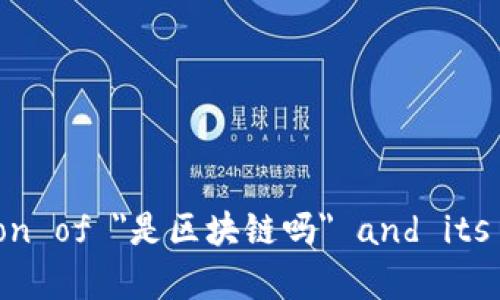<注意:在英文文章中,通常不会出现和这样的标签>
Introduction
Blockchain technology is gaining widespread recognition and adoption across industries, especially finance and healthcare. As a result, people are searching for the translation of blockchain-related terms in various languages, including Chinese. The Chinese phrase "是区块链吗" is commonly used to inquire if a specific technology is blockchain. In this article, we explore the English translation of this phrase and its implications for optimization.
What is the English translation of "是区块链吗"?

The English translation of "是区块链吗" is "Is it blockchain?" This phrase is commonly used in China when people want to verify if a specific technology or application is blockchain-based. For instance, if someone wants to know if a new payment app uses blockchain technology, they would ask "是区块链吗?"
Implications for optimization
The phrase "是区块链吗" can be utilized for optimization, particularly in targeting Chinese-speaking audiences. Since people are searching for this phrase, using it in website content and metadata can increase the likelihood of appearing in search results related to blockchain technology. For instance, if a fintech company uses blockchain technology in its products, it can include "是区块链吗" in the metadata of its website to optimize for .
Related questions

1. What is blockchain technology?
Blockchain technology is a distributed database that provides a secure and transparent way of storing and sharing data. It is a decentralized system that utilizes cryptography to secure transactions and preserve anonymity. Blockchain operates on a peer-to-peer network, meaning that transactions are validated by network participants rather than a central authority.
2. How does blockchain technology work?
Blockchain technology works by creating a chain of blocks that contain transactions. Each block is linked to the previous one, creating an unbroken chain of data. Transactions are verified and broadcast to the network of nodes, which are incentivized to validate transactions with rewards. Once a transaction is approved, it becomes a part of the blockchain and cannot be altered.
3. What are the benefits of blockchain technology?
Blockchain technology has several benefits, including decentralization, transparency, security, and efficiency. Since it operates on a distributed network, there is no central authority, reducing the risk of hacking or corruption. Transactions are transparent and immutable, meaning that they cannot be tampered with. Blockchain also allows for faster and cheaper transactions, as it eliminates the need for intermediaries.
4. What are some use cases of blockchain technology?
Blockchain technology has diverse applications across various industries. In finance, it can be used for secure and transparent transactions, cross-border payments, and identity verification. In healthcare, it can facilitate secure sharing of medical records. Supply chain management, voting systems, and real estate transfer are other use cases.
5. Is blockchain technology secure?
Blockchain technology is secure due to its decentralized architecture and cryptographic protocols. The distributed network reduces the risk of hacking, as an attacker would need to control the majority of the network to alter transactions. Transactions are secured with public key cryptography, making them resistant to tampering. However, like any technology, blockchain is not completely foolproof and requires ongoing security measures.
6. What future developments can we expect in blockchain technology?
Blockchain technology is still a relatively new and rapidly evolving field. Future developments can be expected in areas such as scalability, interoperability with other systems, and increased adoption by industries. Advancements in artificial intelligence and the internet of things may also intersect with blockchain technology to create new use cases.
 The English translation of "是区块链吗" is "Is it blockchain?" This phrase is commonly used in China when people want to verify if a specific technology or application is blockchain-based. For instance, if someone wants to know if a new payment app uses blockchain technology, they would ask "是区块链吗?"
The English translation of "是区块链吗" is "Is it blockchain?" This phrase is commonly used in China when people want to verify if a specific technology or application is blockchain-based. For instance, if someone wants to know if a new payment app uses blockchain technology, they would ask "是区块链吗?"

 The English translation of "是区块链吗" is "Is it blockchain?" This phrase is commonly used in China when people want to verify if a specific technology or application is blockchain-based. For instance, if someone wants to know if a new payment app uses blockchain technology, they would ask "是区块链吗?"
The English translation of "是区块链吗" is "Is it blockchain?" This phrase is commonly used in China when people want to verify if a specific technology or application is blockchain-based. For instance, if someone wants to know if a new payment app uses blockchain technology, they would ask "是区块链吗?"




